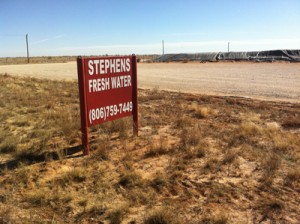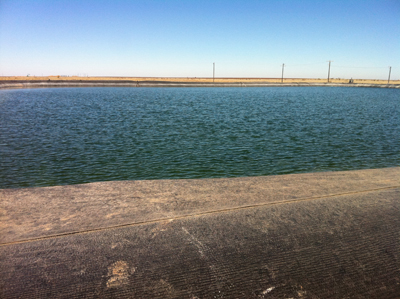Water, the universal solvent, the element that puts the “hydraulic” in hydraulic fracturing—this force of nature that also is a force that drives oil and gas exploration and production—is the hottest commodity in the industry.
The No. 1 issue facing the Permian Basin today is not jobs or the economy. It is water.
 With drought conditions continuing and many area lakes, such as Lake Meredith, resembling a mud puddle rather than a source of fresh water, cities, including Midland and San Angelo and small towns all across West Texas, are concerned about their future water supply.
With drought conditions continuing and many area lakes, such as Lake Meredith, resembling a mud puddle rather than a source of fresh water, cities, including Midland and San Angelo and small towns all across West Texas, are concerned about their future water supply.
“Unfortunately, the outlook for the next few months says the drought will develop further,” said Barney Austin, Ph.D., director of hydrologic services for INTERA, a leader in geosciences and engineering consulting with corporate headquarters in Austin but offices around the world. “That is bad news for Oklahoma and Texas and all the way through the Midwest up to the Dakotas.”
Austin, a professional engineer, is someone who has worked in the area of water resources for more than 20 years, specializing in hydrology, hydraulics, planning, and environmental flows. He pointed out that he works primarily with ground water districts and regional planning groups, noting that the Texas Commission on Environmental Quality (TCEQ) has identified more than a dozen public water systems in Texas that could fail if drought conditions persist.
“These public water systems aren’t confined to a specific region or specific source of water,” Austin added. “They are spread out across the state and include both ground and surface water suppliers.”
The oil and gas industry is also feeling the water shortage pinch. Although the industry’s water requirements are much smaller than the needs of municipalities and agriculture, large quantities of fresh water are necessary for hydraulic fracturing. Of course, the industry also faces the public relations issue of using water for fracking when drinking water is in short supply. With the Permian Basin currently booming thanks to the shale and tight oil resource plays such as the Wolfberry and horizontal drilling in the Wolfcamp, Bone Spring, and emerging Cline Shale plays, operators have been forced to address the water issue.
“When we first started doing this, if you mentioned water treatment, you got laughed out of the room,” recalled Robert Briggs, Permian Basin supervisor for Midland-based Water Cleaning Service.
Now, five years later, the number of companies treating flowback water for re-use in frac jobs is “ten-fold compared to what it was,” according to Briggs.
“People have finally realized that water is an issue that has to be tackled,” he continued. “At a recent meeting of the American Association of Drilling Engineers in Midland, we were told the Railroad Commission of Texas is fixing to set stiffer regulations requiring the re-use of water. The technology is out there.”
In fact, Briggs claimed Water Cleaning Services can treat produced or flowback water for re-use at 20 to 80 cents per barrel less than it costs operators to haul it off to disposal wells and replace it with new fresh water.
“The good thing is the price of oil has been high, so the oil and gas industry has been able to buy water from farmers,” Austin added. “If the price of oil comes down, it will be less affordable.”
Water is more than a critical issue—it is also big business. To address the issue, Permian Basin Oil and Gas magazine, in this first installment of a two-part series on water, spoke with a variety of sources in Austin, as well as with a water resources expert, with a farmer who is supplementing his income by selling water (which he uses for irrigating his cotton crop), with oil and gas service companies that provide fracking services, with a company that specializes in moving and storing water, and with a couple of companies who treat flowback water in different ways for re-use in the hydraulic fracturing process.
Supplying fresh water
Val Stephens is a cotton farmer whose farm lies about 30 miles northeast of Andrews. He says his farm is on the “very bottom end of the Ogallala Aquifer,” meaning that he enjoys an ample supply of water for irrigation of his cotton crop.
“I have an extensive irrigation system, and when several [oil] wells were drilled on my land, the [drilling] company inquired about getting water from me,” he explained.
So Stephens dug a pit on his property about 100 feet off Highway 115, on a stretch of road between Andrews and the tiny community of Patricia. There he pumps water from his irrigation system into the pit, which can hold 100,000 barrels. Its location next to the highway gives frac companies easy access to pump the water into their trucks.
Stephens said the amount of water used by the frac companies fluctuates greatly.
“Some months, the pit could be drained, while other months we haven’t sold 1,000 barrels,” he pointed out.
Stephens added that he was able to irrigate his cotton and still keep the pit filled last summer. Of course, he doesn’t use his irrigation system for his crops from September through the spring. Theoretically, he said, the pit should be able to hold rain water, but there hasn’t been enough rain recently to test that theory. He said about two dozen different companies purchase water from his pit.
A number of farmers have done the same thing as Stephens, although Stephens says some of the pits are much smaller, holding only 25,000 to 30,000 barrels of water.
With the effects of the drought hindering his farming success, the opportunity to supplement his income by selling water to the oil and gas industry has been a nice unexpected addition to his operation, Stephens said.
“We have been blessed,” he stated.
Moving, Storing Water
Of course, one of the most important aspects of the oil and gas industry today is the business of water, whether it is transporting it to the well site for a frac job, storing it, or hauling the flowback water to a disposal well.
That is the job of Dragon Products, Ltd., which is owned by Modern Group, Inc., an independent family-owned business that was founded in 1963. The company is based in Beaumont.
“We manufacture pumps that transfer the water from the source to the wellhead through aluminum pipes,” offered Willo Crenshaw, who lives in Austin and is in sales with the company’s South Texas tank and trailer division. “We make the tanker trailers that haul the water between wells and haul it to the disposal well, as well as tanks that hold the water.”
From frac tanks to vacuum trailers, 400-barrel uprights and water corrals, Dragon is in the business of supporting companies’ liquid hauling and storage needs, according to Crenshaw.
“We build the equipment to move it, hold it, and store it,” he said, adding that Dragon offers 24/7 access to spare parts for oilfield companies and major services companies. Dragon also sells and services production tanks for operators.
Crenshaw, who acknowledged that the drought impacts the oil and gas industry and thus has an effect on Dragon’s business, said the water hauling and storage requirements vary from one region of the country to another.
“All oil and gas plays are different,” he observed, “from the type of tanks required to whether or not they use holding ponds. The types of wells, the geological structures, and how much water is produced all impact the type of equipment provided by Dragon.”
Crenshaw agreed there is a real interest in conserving water by re-using the produced or flowback water that comes back to the surface in the well’s production cycle.
“There is a real concerted effort to be good stewards of the environment,” he said, “by using the least amount of water possible.”
Water Treatment
Peter Pappas, vice president of growth and business development for Fort Worth-based Bosque Systems, LLC, said his company is involved in working with operators to provide customized water management solutions. “We work with each operator to determine which solution is the most appropriate for their specific water requirements,” Pappas said. Bosque Systems owns and operates several salt-water disposal facilities and has an internal project management team able to design, engineer, and build water gathering systems for operators. In addition, the firm is leading the water treatment and recycling arena which allows for re-using water in fracturing wells, limiting the need for fresh water and thus reducing the environmental footprint of the industry.
Water is an essential component for oil and natural gas production during both the drilling and hydraulic fracturing processes. Most of this water comes from surface water sources such as area lakes, ponds, rivers, and municipal supplies. Historically, the water used in drilling and hydraulic fracturing has been a one-time use, and disposed of. With recent droughts over the previous five years, oil and natural gas operators have been seeking alternative sources of water to be used in aiding their production to minimize their ecological impacts.
“We have contracts with major operators across multiple oil and gas plays to treat their water for re-use in the hydraulic fracturing process,” said Pappas, who noted that water recycling is an important topic these days because of the increase in oil and gas production in North America coupled with fresh water shortages.
Water from fracturing operations is exposed to millions of naturally occurring microbial contaminants which can cause souring; corrosion; plugging in pipelines and injection wells, pumps, and filters; and emulsion problems. Partnering with oil and gas operators, Bosque has identified a need for an environmentally safe, effective, and cost-efficient solution for treating water being used for hydraulic fracturing.
Among several technologies and services Bosque Systems offers in its portfolio, the company utilizes a patent pending Dionix technology to kill all microbes in the source water.
“Microbes in the water have long been a problem in the oil and gas industry. Bosque’s Dionix system uses cutting edge science to deliver microbe free water to the frac industry,” Robert Mitchell, Bosque’s director of technology, said. “Microbes cause many operational issues for the oil and gas operator such as corrosion and H2S souring of the well, just to name a few.”
For his own part, Pappas said that having mobile water treatment units allows Bosque to integrate with the frac crew and move seamlessly from job to job. “We have treated millions of barrels of both fresh and produced water. Our cost-effective solution has better efficacy than traditional biocides, and is an environmentally friendly solution,” he said.
The other technology employed by Bosque Systems, according to Mitchell, is a mobile water recycling unit, which precipitates solids in the water and extracts them.
Mitchell said Bosque has mobile units dedicated to different regions of the country, including the Permian Basin, the Mid-Continent, the Eagle Ford Shale in South Texas, and the Bakken Shale in North Dakota.
Reverse Osmosis
Midland-based Water Cleaning Service also used electrocoagulation to pretreat the water, as a step to remove suspended solids and hydrocarbons and to kill bacteria, according to Briggs, the company’s Permian Basin supervisor.
“We use as little chemicals as possible,” he explained. “We try to limit the use of chemicals to reduce what goes back into the ground. WCS manipulates the pH to bring more ions into solution to drop out during settling.”
After the water goes through the EC (electrocoagulation) Unit, Briggs said it goes through reverse osmosis, making the water a comparable quality to that coming out of a water well.
“Everything is in a mobile unit,” he added. “We can rig down and rig back up by the end of the day at a different site.”
Water Cleaning Services also offers a filtration process that pulls the solids out of the water for reuse during the drillout, a process that doesn’t require the water purity needed to frac.
Briggs admitted that those at the field level have been slow to accept the need for treating and recycling water.
“People are scared of what they don’t understand, and down at the field level they don’t understand treating water,” he said. “They are stuck in doing things the way they have always done it. However, we are starting to see companies show more interest about treating water and practicing recycling. We treated roughly a million barrels of water in the last year.”
Thinking Outside the Box
INTERA’s Austin said there is no one simple solution to the water issues facing the oil and gas industry and drought-stricken West Texas.
“I think we need to think outside the box,” he stated, “beyond simply drilling new wells and building reservoirs to strategies like aquifer storage and recovery.”
Another of those “outside-the box” solutions, according to Austin, is desalination, which could treat brackish water so it could be re-used for a variety of purposes. The Permian Basin has an abundance of brackish water, but it is not fit for use in fracking, agricultural irrigation, or providing drinking water because of its high salinity.









